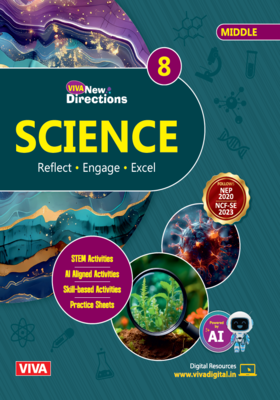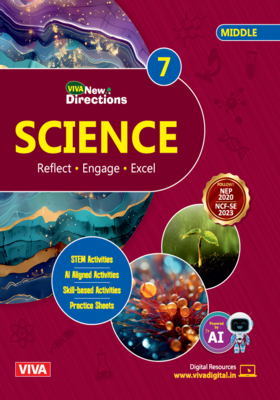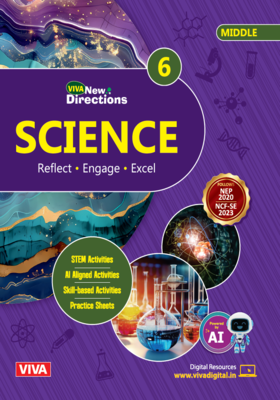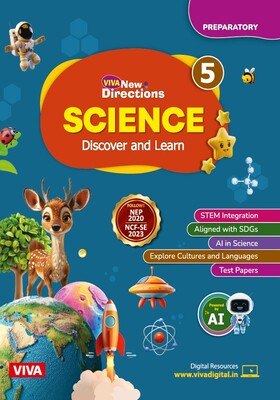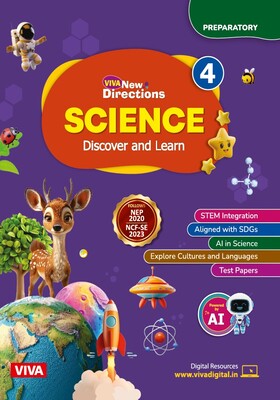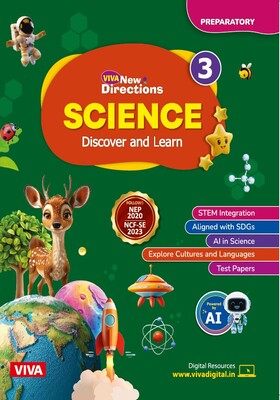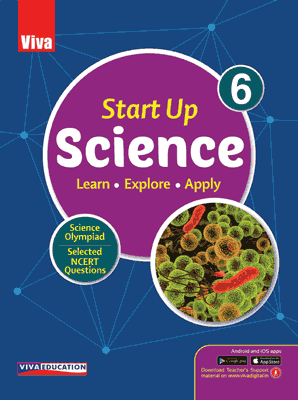
Viva Start Up Science, 6
Viva Start Up Science, 6
Learn ÔÇó Explore ÔÇó Apply (Science Olympiad, Selected NCERT Questions)
₹695.00
Go to cartISBN: 9789388386050
Bind: Paperback
Year: 2020
Pages: 264
Size: 216 x 279 mm
Publisher: Viva Education
Published in India by: Viva Education
Exclusive Distributors: Viva Books
Start Up Science for classes 6 to 8 exposes children to the vibrant nature and to the physical and chemical principles underlying various natural phenomena. The series is based on the principles of child-centered education, activity-based learning and holistic child development. It presents the subject matter in a carefully structured manner keeping in mind the vision of the National Curriculum Framework.
Key Features of Start Up Science 6 to 8
- Simple, easy to understand language and appropriately graded
- Margmments consisting of word meanings, Key Facts, Do You Know, Mind Scramblers and Classroom Discussions (containing questions based on Thinking Skills)
- In-text questions in Answer Orally
- A wide variety of exercises to assess the concepts learnt
- Ample number of tasks including activities and projects
- Sample test papers given to assess the knowledge of students
- Practice questions for Science Olympiad
Online Support Material:
- Printable Worksheets for Each Chapter
- Printable Practice Test Papers
- Answer Key
Online Support: www.vivadigital.in
Download Teacher's Support material on www.vivadigital.in
Download the Start Up Science app to enjoy the wholesome interactive learning experience.
Also Available:
- Interactive Learning App
- Start Up Science Workbooks
- Detailed Teacher's Resource Material
- Start Up Science Lab Manuals
Target Audience:
Students of CBSE Class 6.
Contents:
Chapter 1: Sources of Food ? Food Varieties ? Food ingredients ? Food Eaten by Animals ? Sources of Food ? Plants as Source of Food ? Animals as Source of Food
Chapter 2: Components of Food ? Components of Food ? Nutrients or Foods On the Basis of their Role ? Balanced Diet ? Deficiency Diseases
Chapter 3: Separation of Substances???Cleaning of Food ? Need For Separation of Substances From a Mixture ? Methods of Separation ? Separation Using More than One Method
Chapter 4: Materials of Daily Use: Clothes ? History of Clothing ? Different Types of Fabrics ? Cotton ? Jute
Practice Paper (Based On Chapters 1 to 4)
Chapter 5: Grouping Materials of Different Kinds ? Grouping of Materials or Things ? Properties of Materials ? Properties of a Few Commonly Used Materials
Chapter 6: How Things Change ? Reversible and Irreversible Changes ? Reversible Change ? Irreversible Change ? Physical and Chemical Changes ? Physical Changes ? Chemical Changes ? Expansion and Contraction ? Physical Changes in Water
Chapter 7: Things around Us ? Characteristics Common to Living Things ? Differences between Living and Nonliving Things ? Features Common between Living and Non-Living Things ? Differences between Plants and animals
Chapter 8: The Habitat of The Living ? Habitat???Living Place of an organism ? Types of Habitats ? Components of a Habitat ? Habitat and Adaptation ? Adaptations in Terrestrial Habitats ? Adaptations in Aquatic Habitats
Chapter 9: Plants???Form and Function ? Categories of Plants ? Parts of a Plant and their Functions
Practice Paper (Based On Chapters 5 to 9)
Test Yourself (Based On Chapters 1 to 9)
Chapter 10: Animals???Form and Function ? The inside of Our Bodies ? Body Movements ? Movements in Animals ? Movements in Human Beings
Chapter 11: Motion and Measurement of Distances ? Course of Development of Transport ? Measurement ? Motion ? More than One Type of Motion
Chapter 12: Electric Current and Circuits torch ? Electric Current ? Electric Circuit ? Electric Switch ? Electric Conductors and insulators
Chapter 13: Magnets ? Discovery of Magnets ? Magnetic and Non-Magnetic Materials ? Poles of a Magnet ? Make Your Own Magnet ? Make Your Own Magnetic Compass ? A Few Cautions
Practice Paper (Based On Chapters 10 to 13)
Chapter 14: Rain, Thunder and Lightning ? Three States of Water ? interconversion of States of Water ? Formation of Clouds and Water Cycle ? Thunder and Lightning
Chapter 15: Light ? Transparent, Translucent and Opaque Objects ? Shadow ? Pinhole Camera ? Mirrors, Images and Reflection
Chapter 16: Importance of Water ? Water???A Natural Resource ? Importance of Water ? Sources of Water ? Water as a Disaster ? Water Conservation ? Rainwater Harvesting
Chapter 17: Importance of Air ? Atmosphere ? Air is Matter ? Air???A Mixture ? Other Uses of Air
Chapter 18: Waste ? Types of Wastes ? Methods of Managing Waste ? Steps to Reduce Generation of Waste ? Recycling of Paper ? Plastics
Practice Paper (Based On Chapters 14 to 18)
Test Yourself (Based On Chapters 10 to 18)
Practice Questions For Science Olympiad
Glossary
About the Authors:
Neha Sharma is a gold medalist in M.Tech. from Guru Gobind Singh lndraprastha University. She did her M.Sc. in Physics from University of Delhi and has worked as an Assistant Professor in Galgotias College of Engineering and Technology, Greater Noida for more than seven years. Presently she is working as PGT Physics in Venkateshwar Global School, Rohini.
Akanksha Dudpuri (M.Tech. in Biotechnology) is an educational books editor and a resource person based in New Delhi.
About the Series Editor:
Ajoy Ghatak has served as a Professor of Physics in IIT Delhi. He obtained his M.Sc. from the University of Delhi and Ph.D. from Cornell University. The awards he has received include the 2008 SPlE Educator Award, the 2003 Optical Society of America Esther Hoffman Beller Award, the CSlR S.S. Bhatnagar Award, the 16th Khwarizmi International Award, the International Commission for Optics Galileo Galilei Award and the Meghnad Saha Award for outstanding research contributions in theoretical sciences. He received a D.Sc. (Honoris Causa) from the University of Burdwan in 2007. Professor Ghatak has published numerous books in the areas of Optics, Quantum Mechanics and Fiber Optics and is a tireless promoter of science education worldwide.
